#ad tech industry
Link
“The Justice Department and a group of eight states sued Google on Tuesday, accusing it of illegally abusing a monopoly over the technology that powers online advertising, in the agency’s first antitrust lawsuit against a tech giant under President Biden and an escalation in legal pressure on one of the world’s biggest internet companies.
The lawsuit said Google had “corrupted legitimate competition in the ad tech industry by engaging in a systematic campaign to seize control of the wide swath of high-tech tools used by publishers, advertisers and brokers to facilitate digital advertising.”
The lawsuit asked U.S. District Court for the Eastern District of Virginia to force Google to sell much of its suite of ad technology products, which include software for buying and selling ads, a marketplace to complete the transactions and a service for showcasing the ads across the internet. The lawsuit also asked the court to stop the company from engaging in allegedly anticompetitive practices...
The new lawsuit “adds another important complication to Google’s efforts to deal with regulators worldwide,” said William Kovacic, a former chairman of the Federal Trade Commission. “There’s a chance one or more of these challenges is going to make its way through and hit the target...”
Attorney General Merrick B. Garland said monopolies “threaten the free and fair markets upon which our economy is based.” He added, “We will aggressively protect consumers, safeguard competition and work to ensure economic fairness and opportunity for all.”
The Biden administration is trying to use uncommon legal theories to clip the wings of some of America’s largest businesses. The F.T.C. recently asked a judge to block Meta from buying a virtual-reality start-up, a rare case that argues a deal could harm potential competition in a nascent market. The agency has also challenged Microsoft’s $69 billion purchase of the video game publisher Activision Blizzard, a notable action because the two companies are not primarily seen as direct competitors.
These efforts are expected to meet fierce resistance in federal courts. Judges have for decades subscribed to a view that antitrust violations should mostly be determined by whether they increase prices for consumers. But Jonathan Kanter, the chief of the Justice Department’s antitrust division, and Lina Khan, the F.T.C. chair, have said they are willing to lose cases that allow them to stretch the boundaries of the law and that put corporate America on notice.”
-via The New York Times, 1/24/23
#justice department#doj#merrick garland#biden#google#online ads#advertising industry news#advertising#monopoly#antitrust#us politics#corporations#big tech#good news#hope
210 notes
·
View notes
Text
AdSense full-screen inline ads Update 2023
Full-screen inline ads are more likely to come with click and impress. So there is no doubt that this advertising method will increase the revenue of
If you have a website that relies on Google AdSense revenue, there is a piece of new good news for you. That means full-screen inline ads are newly introduced.
This is a full-screen inline ad that may appear between your web article. For those who…
View On WordPress
#ads#adsense in line ads fixing in tamil#adsense inline ads in tamil#article inline ad#google ads#how to add an inline ad in content#how to customize inline ads#inline#inline 6#inline banner ad flutter#inline hooks#inline monitoring#inline skates#inline skating#inline text ads#inline video#inline6#online advertising (industry)#online it courses#online tech training#start inline skating#windows 10 inline ads
2 notes
·
View notes
Text

What We Learned from Flying a Helicopter on Mars

The Ingenuity Mars Helicopter made history – not only as the first aircraft to perform powered, controlled flight on another world – but also for exceeding expectations, pushing the limits, and setting the stage for future NASA aerial exploration of other worlds.
Built as a technology demonstration designed to perform up to five experimental test flights over 30 days, Ingenuity performed flight operations from the Martian surface for almost three years. The helicopter ended its mission on Jan. 25, 2024, after sustaining damage to its rotor blades during its 72nd flight.
So, what did we learn from this small but mighty helicopter?
We can fly rotorcraft in the thin atmosphere of other planets.
Ingenuity proved that powered, controlled flight is possible on other worlds when it took to the Martian skies for the first time on April 19, 2021.
Flying on planets like Mars is no easy feat: The Red Planet has a significantly lower gravity – one-third that of Earth’s – and an extremely thin atmosphere, with only 1% the pressure at the surface compared to our planet. This means there are relatively few air molecules with which Ingenuity’s two 4-foot-wide (1.2-meter-wide) rotor blades can interact to achieve flight.
Ingenuity performed several flights dedicated to understanding key aerodynamic effects and how they interact with the structure and control system of the helicopter, providing us with a treasure-trove of data on how aircraft fly in the Martian atmosphere.
Now, we can use this knowledge to directly improve performance and reduce risk on future planetary aerial vehicles.

Creative solutions and “ingenuity” kept the helicopter flying longer than expected.
Over an extended mission that lasted for almost 1,000 Martian days (more than 33 times longer than originally planned), Ingenuity was upgraded with the ability to autonomously choose landing sites in treacherous terrain, dealt with a dead sensor, dusted itself off after dust storms, operated from 48 different airfields, performed three emergency landings, and survived a frigid Martian winter.
Fun fact: To keep costs low, the helicopter contained many off-the-shelf-commercial parts from the smartphone industry - parts that had never been tested in deep space. Those parts also surpassed expectations, proving durable throughout Ingenuity’s extended mission, and can inform future budget-conscious hardware solutions.

There is value in adding an aerial dimension to interplanetary surface missions.
Ingenuity traveled to Mars on the belly of the Perseverance rover, which served as the communications relay for Ingenuity and, therefore, was its constant companion. The helicopter also proved itself a helpful scout to the rover.
After its initial five flights in 2021, Ingenuity transitioned to an “operations demonstration,” serving as Perseverance’s eyes in the sky as it scouted science targets, potential rover routes, and inaccessible features, while also capturing stereo images for digital elevation maps.
Airborne assets like Ingenuity unlock a new dimension of exploration on Mars that we did not yet have – providing more pixels per meter of resolution for imaging than an orbiter and exploring locations a rover cannot reach.

Tech demos can pay off big time.
Ingenuity was flown as a technology demonstration payload on the Mars 2020 mission, and was a high risk, high reward, low-cost endeavor that paid off big. The data collected by the helicopter will be analyzed for years to come and will benefit future Mars and other planetary missions.
Just as the Sojourner rover led to the MER-class (Spirit and Opportunity) rovers, and the MSL-class (Curiosity and Perseverance) rovers, the team believes Ingenuity’s success will lead to future fleets of aircraft at Mars.
In general, NASA’s Technology Demonstration Missions test and advance new technologies, and then transition those capabilities to NASA missions, industry, and other government agencies. Chosen technologies are thoroughly ground- and flight-tested in relevant operating environments — reducing risks to future flight missions, gaining operational heritage and continuing NASA’s long history as a technological leader.
youtube
You can fall in love with robots on another planet.
Following in the tracks of beloved Martian rovers, the Ingenuity Mars Helicopter built up a worldwide fanbase. The Ingenuity team and public awaited every single flight with anticipation, awe, humor, and hope.
Check out #ThanksIngenuity on social media to see what’s been said about the helicopter’s accomplishments.
youtube
Learn more about Ingenuity’s accomplishments here. And make sure to follow us on Tumblr for your regular dose of space!
4K notes
·
View notes
Text
Digi_Ads_

#Take Your Cricket Exchange Business To New Heights🌟🚀#•#Our Comprehensive Tutorial Teches You the Ins and Outs of Running Effective Ads for The Cricket Exchange Industry.#⭐️ Ad Baning Solution#⭐️ Ad Account Solution#⭐️ Minium CPC#DM us or contact Digi_Ads_ at#📞+91 9625939824#gda#gdaonline#digitalmarketingagencyonline#digitalmarkeing#digitalmarketingservices#socialmediamarketing#socialmediamarketingagency#socialmedia#socialmediatips#marketingstrategy#digitalmarketingstrategy#GoogleAdsTips#AdWordsTips#PPCMarketing#OnlineAds#AdWordsManagement#PPCAdvertising#AdWordsExpert#AdWordsPerformance#PPCSuccess#GoogleAdWords#AdWordsOptimization
0 notes
Text
Your car spies on you and rats you out to insurance companies

I'm on tour with my new, nationally bestselling novel The Bezzle! Catch me TOMORROW (Mar 13) in SAN FRANCISCO with ROBIN SLOAN, then Toronto, NYC, Anaheim, and more!

Another characteristically brilliant Kashmir Hill story for The New York Times reveals another characteristically terrible fact about modern life: your car secretly records fine-grained telemetry about your driving and sells it to data-brokers, who sell it to insurers, who use it as a pretext to gouge you on premiums:
https://www.nytimes.com/2024/03/11/technology/carmakers-driver-tracking-insurance.html
Almost every car manufacturer does this: Hyundai, Nissan, Ford, Chrysler, etc etc:
https://www.repairerdrivennews.com/2020/09/09/ford-state-farm-ford-metromile-honda-verisk-among-insurer-oem-telematics-connections/
This is true whether you own or lease the car, and it's separate from the "black box" your insurer might have offered to you in exchange for a discount on your premiums. In other words, even if you say no to the insurer's carrot – a surveillance-based discount – they've got a stick in reserve: buying your nonconsensually harvested data on the open market.
I've always hated that saying, "If you're not paying for the product, you're the product," the reason being that it posits decent treatment as a customer reward program, like the little ramekin warm nuts first class passengers get before takeoff. Companies don't treat you well when you pay them. Companies treat you well when they fear the consequences of treating you badly.
Take Apple. The company offers Ios users a one-tap opt-out from commercial surveillance, and more than 96% of users opted out. Presumably, the other 4% were either confused or on Facebook's payroll. Apple – and its army of cultists – insist that this proves that our world's woes can be traced to cheapskate "consumers" who expected to get something for nothing by using advertising-supported products.
But here's the kicker: right after Apple blocked all its rivals from spying on its customers, it began secretly spying on those customers! Apple has a rival surveillance ad network, and even if you opt out of commercial surveillance on your Iphone, Apple still secretly spies on you and uses the data to target you for ads:
https://pluralistic.net/2022/11/14/luxury-surveillance/#liar-liar
Even if you're paying for the product, you're still the product – provided the company can get away with treating you as the product. Apple can absolutely get away with treating you as the product, because it lacks the historical constraints that prevented Apple – and other companies – from treating you as the product.
As I described in my McLuhan lecture on enshittification, tech firms can be constrained by four forces:
I. Competition
II. Regulation
III. Self-help
IV. Labor
https://pluralistic.net/2024/01/30/go-nuts-meine-kerle/#ich-bin-ein-bratapfel
When companies have real competitors – when a sector is composed of dozens or hundreds of roughly evenly matched firms – they have to worry that a maltreated customer might move to a rival. 40 years of antitrust neglect means that corporations were able to buy their way to dominance with predatory mergers and pricing, producing today's inbred, Habsburg capitalism. Apple and Google are a mobile duopoly, Google is a search monopoly, etc. It's not just tech! Every sector looks like this:
https://www.openmarketsinstitute.org/learn/monopoly-by-the-numbers
Eliminating competition doesn't just deprive customers of alternatives, it also empowers corporations. Liberated from "wasteful competition," companies in concentrated industries can extract massive profits. Think of how both Apple and Google have "competitively" arrived at the same 30% app tax on app sales and transactions, a rate that's more than 1,000% higher than the transaction fees extracted by the (bloated, price-gouging) credit-card sector:
https://pluralistic.net/2023/06/07/curatorial-vig/#app-tax
But cartels' power goes beyond the size of their warchest. The real source of a cartel's power is the ease with which a small number of companies can arrive at – and stick to – a common lobbying position. That's where "regulatory capture" comes in: the mobile duopoly has an easier time of capturing its regulators because two companies have an easy time agreeing on how to spend their app-tax billions:
https://pluralistic.net/2022/06/05/regulatory-capture/
Apple – and Google, and Facebook, and your car company – can violate your privacy because they aren't constrained regulation, just as Uber can violate its drivers' labor rights and Amazon can violate your consumer rights. The tech cartels have captured their regulators and convinced them that the law doesn't apply if it's being broken via an app:
https://pluralistic.net/2023/04/18/cursed-are-the-sausagemakers/#how-the-parties-get-to-yes
In other words, Apple can spy on you because it's allowed to spy on you. America's last consumer privacy law was passed in 1988, and it bans video-store clerks from leaking your VHS rental history. Congress has taken no action on consumer privacy since the Reagan years:
https://www.eff.org/tags/video-privacy-protection-act
But tech has some special enshittification-resistant characteristics. The most important of these is interoperability: the fact that computers are universal digital machines that can run any program. HP can design a printer that rejects third-party ink and charge $10,000/gallon for its own colored water, but someone else can write a program that lets you jailbreak your printer so that it accepts any ink cartridge:
https://www.eff.org/deeplinks/2020/11/ink-stained-wretches-battle-soul-digital-freedom-taking-place-inside-your-printer
Tech companies that contemplated enshittifying their products always had to watch over their shoulders for a rival that might offer a disenshittification tool and use that as a wedge between the company and its customers. If you make your website's ads 20% more obnoxious in anticipation of a 2% increase in gross margins, you have to consider the possibility that 40% of your users will google "how do I block ads?" Because the revenue from a user who blocks ads doesn't stay at 100% of the current levels – it drops to zero, forever (no user ever googles "how do I stop blocking ads?").
The majority of web users are running an ad-blocker:
https://doc.searls.com/2023/11/11/how-is-the-worlds-biggest-boycott-doing/
Web operators made them an offer ("free website in exchange for unlimited surveillance and unfettered intrusions") and they made a counteroffer ("how about 'nah'?"):
https://www.eff.org/deeplinks/2019/07/adblocking-how-about-nah
Here's the thing: reverse-engineering an app – or any other IP-encumbered technology – is a legal minefield. Just decompiling an app exposes you to felony prosecution: a five year sentence and a $500k fine for violating Section 1201 of the DMCA. But it's not just the DMCA – modern products are surrounded with high-tech tripwires that allow companies to invoke IP law to prevent competitors from augmenting, recongifuring or adapting their products. When a business says it has "IP," it means that it has arranged its legal affairs to allow it to invoke the power of the state to control its customers, critics and competitors:
https://locusmag.com/2020/09/cory-doctorow-ip/
An "app" is just a web-page skinned in enough IP to make it a crime to add an ad-blocker to it. This is what Jay Freeman calls "felony contempt of business model" and it's everywhere. When companies don't have to worry about users deploying self-help measures to disenshittify their products, they are freed from the constraint that prevents them indulging the impulse to shift value from their customers to themselves.
Apple owes its existence to interoperability – its ability to clone Microsoft Office's file formats for Pages, Numbers and Keynote, which saved the company in the early 2000s – and ever since, it has devoted its existence to making sure no one ever does to Apple what Apple did to Microsoft:
https://www.eff.org/deeplinks/2019/06/adversarial-interoperability-reviving-elegant-weapon-more-civilized-age-slay
Regulatory capture cuts both ways: it's not just about powerful corporations being free to flout the law, it's also about their ability to enlist the law to punish competitors that might constrain their plans for exploiting their workers, customers, suppliers or other stakeholders.
The final historical constraint on tech companies was their own workers. Tech has very low union-density, but that's in part because individual tech workers enjoyed so much bargaining power due to their scarcity. This is why their bosses pampered them with whimsical campuses filled with gourmet cafeterias, fancy gyms and free massages: it allowed tech companies to convince tech workers to work like government mules by flattering them that they were partners on a mission to bring the world to its digital future:
https://pluralistic.net/2023/09/10/the-proletarianization-of-tech-workers/
For tech bosses, this gambit worked well, but failed badly. On the one hand, they were able to get otherwise powerful workers to consent to being "extremely hardcore" by invoking Fobazi Ettarh's spirit of "vocational awe":
https://www.inthelibrarywiththeleadpipe.org/2018/vocational-awe/
On the other hand, when you motivate your workers by appealing to their sense of mission, the downside is that they feel a sense of mission. That means that when you demand that a tech worker enshittifies something they missed their mother's funeral to deliver, they will experience a profound sense of moral injury and refuse, and that worker's bargaining power means that they can make it stick.
Or at least, it did. In this era of mass tech layoffs, when Google can fire 12,000 workers after a $80b stock buyback that would have paid their wages for the next 27 years, tech workers are learning that the answer to "I won't do this and you can't make me" is "don't let the door hit you in the ass on the way out" (AKA "sharpen your blades boys"):
https://techcrunch.com/2022/09/29/elon-musk-texts-discovery-twitter/
With competition, regulation, self-help and labor cleared away, tech firms – and firms that have wrapped their products around the pluripotently malleable core of digital tech, including automotive makers – are no longer constrained from enshittifying their products.
And that's why your car manufacturer has chosen to spy on you and sell your private information to data-brokers and anyone else who wants it. Not because you didn't pay for the product, so you're the product. It's because they can get away with it.
Cars are enshittified. The dozens of chips that auto makers have shoveled into their car design are only incidentally related to delivering a better product. The primary use for those chips is autoenshittification – access to legal strictures ("IP") that allows them to block modifications and repairs that would interfere with the unfettered abuse of their own customers:
https://pluralistic.net/2023/07/24/rent-to-pwn/#kitt-is-a-demon
The fact that it's a felony to reverse-engineer and modify a car's software opens the floodgates to all kinds of shitty scams. Remember when Bay Staters were voting on a ballot measure to impose right-to-repair obligations on automakers in Massachusetts? The only reason they needed to have the law intervene to make right-to-repair viable is that Big Car has figured out that if it encrypts its diagnostic messages, it can felonize third-party diagnosis of a car, because decrypting the messages violates the DMCA:
https://www.eff.org/deeplinks/2013/11/drm-cars-will-drive-consumers-crazy
Big Car figured out that VIN locking – DRM for engine components and subassemblies – can felonize the production and the installation of third-party spare parts:
https://pluralistic.net/2022/05/08/about-those-kill-switched-ukrainian-tractors/
The fact that you can't legally modify your car means that automakers can go back to their pre-2008 ways, when they transformed themselves into unregulated banks that incidentally manufactured the cars they sold subprime loans for. Subprime auto loans – over $1t worth! – absolutely relies on the fact that borrowers' cars can be remotely controlled by lenders. Miss a payment and your car's stereo turns itself on and blares threatening messages at top volume, which you can't turn off. Break the lease agreement that says you won't drive your car over the county line and it will immobilize itself. Try to change any of this software and you'll commit a felony under Section 1201 of the DMCA:
https://pluralistic.net/2021/04/02/innovation-unlocks-markets/#digital-arm-breakers
Tesla, naturally, has the most advanced anti-features. Long before BMW tried to rent you your seat-heater and Mercedes tried to sell you a monthly subscription to your accelerator pedal, Teslas were demon-haunted nightmare cars. Miss a Tesla payment and the car will immobilize itself and lock you out until the repo man arrives, then it will blare its horn and back itself out of its parking spot. If you "buy" the right to fully charge your car's battery or use the features it came with, you don't own them – they're repossessed when your car changes hands, meaning you get less money on the used market because your car's next owner has to buy these features all over again:
https://pluralistic.net/2023/07/28/edison-not-tesla/#demon-haunted-world
And all this DRM allows your car maker to install spyware that you're not allowed to remove. They really tipped their hand on this when the R2R ballot measure was steaming towards an 80% victory, with wall-to-wall scare ads that revealed that your car collects so much information about you that allowing third parties to access it could lead to your murder (no, really!):
https://pluralistic.net/2020/09/03/rip-david-graeber/#rolling-surveillance-platforms
That's why your car spies on you. Because it can. Because the company that made it lacks constraint, be it market-based, legal, technological or its own workforce's ethics.
One common critique of my enshittification hypothesis is that this is "kind of sensible and normal" because "there’s something off in the consumer mindset that we’ve come to believe that the internet should provide us with amazing products, which bring us joy and happiness and we spend hours of the day on, and should ask nothing back in return":
https://freakonomics.com/podcast/how-to-have-great-conversations/
What this criticism misses is that this isn't the companies bargaining to shift some value from us to them. Enshittification happens when a company can seize all that value, without having to bargain, exploiting law and technology and market power over buyers and sellers to unilaterally alter the way the products and services we rely on work.
A company that doesn't have to fear competitors, regulators, jailbreaking or workers' refusal to enshittify its products doesn't have to bargain, it can take. It's the first lesson they teach you in the Darth Vader MBA: "I am altering the deal. Pray I don't alter it any further":
https://pluralistic.net/2023/10/26/hit-with-a-brick/#graceful-failure
Your car spying on you isn't down to your belief that your carmaker "should provide you with amazing products, which brings your joy and happiness you spend hours of the day on, and should ask nothing back in return." It's not because you didn't pay for the product, so now you're the product. It's because they can get away with it.
The consequences of this spying go much further than mere insurance premium hikes, too. Car telemetry sits at the top of the funnel that the unbelievably sleazy data broker industry uses to collect and sell our data. These are the same companies that sell the fact that you visited an abortion clinic to marketers, bounty hunters, advertisers, or vengeful family members pretending to be one of those:
https://pluralistic.net/2022/05/07/safegraph-spies-and-lies/#theres-no-i-in-uterus
Decades of pro-monopoly policy led to widespread regulatory capture. Corporate cartels use the monopoly profits they extract from us to pay for regulatory inaction, allowing them to extract more profits.
But when it comes to privacy, that period of unchecked corporate power might be coming to an end. The lack of privacy regulation is at the root of so many problems that a pro-privacy movement has an unstoppable constituency working in its favor.
At EFF, we call this "privacy first." Whether you're worried about grifters targeting vulnerable people with conspiracy theories, or teens being targeted with media that harms their mental health, or Americans being spied on by foreign governments, or cops using commercial surveillance data to round up protesters, or your car selling your data to insurance companies, passing that long-overdue privacy legislation would turn off the taps for the data powering all these harms:
https://www.eff.org/wp/privacy-first-better-way-address-online-harms
Traditional economics fails because it thinks about markets without thinking about power. Monopolies lead to more than market power: they produce regulatory capture, power over workers, and state capture, which felonizes competition through IP law. The story that our problems stem from the fact that we just don't spend enough money, or buy the wrong products, only makes sense if you willfully ignore the power that corporations exert over our lives. It's nice to think that you can shop your way out of a monopoly, because that's a lot easier than voting your way out of a monopoly, but no matter how many times you vote with your wallet, the cartels that control the market will always win:
https://pluralistic.net/2024/03/05/the-map-is-not-the-territory/#apor-locksmith

Name your price for 18 of my DRM-free ebooks and support the Electronic Frontier Foundation with the Humble Cory Doctorow Bundle.

If you'd like an essay-formatted version of this post to read or share, here's a link to it on pluralistic.net, my surveillance-free, ad-free, tracker-free blog:
https://pluralistic.net/2024/03/12/market-failure/#car-wars

Image:
Cryteria (modified)
https://commons.wikimedia.org/wiki/File:HAL9000.svg
CC BY 3.0
https://creativecommons.org/licenses/by/3.0/deed.en
#pluralistic#if you're not paying for the product you're the product#if you're paying for the product you're the product#cars#automotive#enshittification#technofeudalism#autoenshittification#antifeatures#felony contempt of business model#twiddling#right to repair#privacywashing#apple#lexisnexis#insuretech#surveillance#commercial surveillance#privacy first#data brokers#subprime#kash hill#kashmir hill
2K notes
·
View notes
Text
AI generated art is bad for everyone
So many people are asking, will ai replace art - that’s the wrong question. It already has. Not like in the sense that all art from now on will now be ai- but look at how many people rushed to download an $8 app.
And now what’s worse is now the tech industry has that data, that in one day lensa ai made over $1 million. So now we know ai art isn’t going anywhere. They have the proof that it’s worth it financially to use ai
What corporation is going to pay 10k for an illustrated ad campaign when they can spend $8 and $20 for someone of Fiverr to edit out that extra third hand.
Ai is bad for union makeup artists in film. Disney has already announced they plan on using AI instead of “expensive” old age makeup.
It’s bad for everyone & what they will come to expect in both immediacy & cost of creating art.
It’s bad for any artist who has their artwork on social media in any way. Who now have to worry about their art being sampled without their consent or compensation.
This has absolutely changed the art industry.
6K notes
·
View notes
Note
Why do you think tumblr will die in only a few years?
Answer with jargon: a strong correlation between recent economic shifts and chaotic choices by major tech companies is most easily explained if the 'traditional' social media platforms of 2005-2020 are mostly a zero-interest rate phenomenon.
Longer answer, with less jargon: Even though Musk's takeover is making all the headlines recently, the last year has in fact seen major shakeups at many social media platforms, so Twitter is actually part of a trend. Almost inevitably, these are cases of social media companies trying to find a way to squeeze more money out of their userbase (Reddit), cut costs dramatically (Twitter), or both. This marks a sudden departure from a much more relaxed attitude towards revenue in the Pictures Of Cats industry, where the focus was historically more on expanding the userbase to a global scale and then counting on world domination to sort of <????> and then the company would become profitable eventually.
We joke, correctly, that Tumblr has never been profitable. But the entire structure of ad-supported content curation between human users is deeply suspect as a business model; IIRC Twitter was never profitable either, and Facebook has been juicing its numbers in very shenanigany ways. Discord was actually making money on net last I checked, at least a bit, so they're not all completely in the hole. But even if you take the accounting figures at face value, none of these companies has anything like the amount of money that their cultural prominence would suggest. Instead, they're heavily fueled by investment dollars, money given by super-rich people and institutions in the expectation that fueling the growth of the company now will pay off with interest later.
So what changed?
I'm not an expert here, but I'll do my best to muddle through. The American Federal Reserve has one mandate that dominates all others (sometimes called the 'dual mandate'), and one primary tool that it uses to enforce that mandate. The goal is to maintain low (but nonzero) rates of inflation and unemployment, which in their models are deeply interlinked phenomena. The tool is 'rate hikes', or more specifically, tweaking the mandatory rate of interest that banks charge one another when making loans.
As a particular consequence of this, hiking the rate also means that bonds start paying out much better. When the rate hike goes through, that affects people who let the government borrow their personal cash- that is, people who buy bonds- as well as institutions like banks that lend to one another. A rate hike means that you, personally, can make a little extra money by letting the government borrow it for a while. The federal government of the US is a rock-solid low-risk choice for this kind of moneymaking scheme, so the federal interest rate sort of defines the 'number to beat'; to attract investors, a company has to give those investors money at a better percentage than whatever the feds are offering. Particularly since a company is a lot more likely to go out of business than the state!
To wrap this back around to the Pictures Of Cats industry: the higher the rate hike, the better your company needs to be doing (or the less risky it needs to be as an option) to attract big investment dollars. Very high rates make it very hard to convince people to invest in business activity rather than the government itself, and very low rates put moonshots and big dreams on the table, investment-wise, in a way that wouldn't otherwise be possible. Social media companies were one of these big dreams.
In the great financial crisis of 2008, the Fed took the dramatic step of reducing their rate to zero, trying to juice the economy back to life. And ever since then, they've kept it there. This has produced an unprecedented amount of funding for very crazy stuff; it's part of what has allowed so many weird new tech companies (Uber, streaming services, etc.) to get so much money, so quickly, and use that to grow to massive size without a clear model of how they're ever going to make money. This state of affairs kept going for quite a while, with no clear stopping point; that zero-interest environment has been one of the shadowy forces in the background that shaped fundamental contours and limits in how our Very Online World has grown and developed. Until COVID.
Or rather, the bounce back from COVID: we suddenly saw a massive spike in inflation and an incredibly strong labor market, as employees quit in record numbers, negotiated higher salaries, and found better work, and at the same time supply chain issues and other economy stuff caused prices to climb dramatically. Recall the Fed's 'dual mandate', to control the employment rate and inflation. This was, basically, kicking them right in the jooblies. They responded in kind, finally finally raising their rates for the first time in 15 years. For some of the people reading this, it'll be the first significant shift in their entire adult lives.
The goal, as I understand it, is to fight inflation by reducing the amount of outside investment into private companies, forcing them to hire fewer people and pay smaller salaries, ultimately drawing money out of the working economy and driving prices back down by lowering demand for everything. You get paid less, so you eat out less, and buy at cheaper restaurants when you do, so restaurants have to compete harder by lowering their prices; seems pretty dodgy to me as a theory, but it's the theory. And the first part will almost certainly work- companies are going to see less investment.
For social media companies that are still paying most of their salaries with investor dollars instead of revenues, this is especially catastrophic. Without outside investment, they're just a massive pile of expenses waiting to happen, huge yearly costs in developer salaries and server fees. This is why, all of a sudden, every social media company is suddenly making bonkers decisions. They're noticing that nobody wants to give them any more money! So they're trying to figure out how to live a lot more cheaply, to actually somehow for reals turn their giant userbases in to some kind of actual revenue stream, or both.
Tumblr is kind of the ur-example of this kind of thing, supporting a very large userbase with no coherent plan whatsoever to start paying its staff with our dollars instead of investors' dollars. When interest rates were low and Scrooge McDuck had nowhere else to hide his pile of gold coins, a crazy kid with a dream was the best alternative available to him. But now, unless something changes, he's going to notice he can just buy bonds instead, and that crazy kid can go take a hike.
That's why I think Tumblr is living on borrowed time, though I don't know how much. Like all cartoons, the economy doesn't really fall off a cliff until somebody looks down and notices they've been standing on thin air this whole time. But they always fall eventually; that's the gag.
#I am not an economics#so if somebody wants to grade my accuracy here#that would be welcome#this is the situation as I understand it but my models are hazy
2K notes
·
View notes
Text
One thing my brain keeps going back to about Pacific Rim (besides the rad giant robots) is the whole existence of kaiju organ harvesters and their implications.
Like, you have Hannibal Chau, a bizarre and interesting character, but we’re presented with a black market operation that seems mostly interested in the “alternative medicine” uses of kaiju parts.
But my brain demands to know: what does the corporate kaiju harvesting industry look like? Sure kaiju blood is toxic, but there are plenty of toxic materials that have useful applications. Are there chemical companies studying kaiju organs? Big-Pharma jumping on the kaiju bone-powder bandwagon? Are bio-tech firms studying kaiju hide to make tougher materials? Agribusinesses clamoring to acquire kaiju crap for fertilizer?
I’m picturing something like the age of whaling, when humans hunted giant animals and carved them up to feed insatiable industries. Whale-oil lighting lanterns for entire cities, whale-bone being used in everything from knick-knacks, tools, umbrellas, and corsets. Ambergris alone was used in perfumes, medicines, cooking. It was even added to wine as an aphrodisiac.
We glimpsed how kaiju affected pop-culture. Now picture a kaiju smashing a city, but the stock market going up for construction companies (rebuilding the cities), vulture real estate (buying the destroyed land cheap), and all the other corporations that profit from the systematic dismantling of a kaiju corpse and making money off of its parts. Sure, a city was roughed up and who knows how many thousands are dead, but it’s a better windfall when a kaiju makes landfall. It’s always less profitable when jaegers kill them too quickly; sea-based extractions are so much more expensive.
Imagine entire industries, entire economies that don’t just make money from the devastation of kaiju attacks, but grow dependent on them. And then the laws, the squabbles over those valuable, resource-rich kaiju corpses. If a kaiju attacks one country but keeps rampaging and is killed in the country next door, who has claim over the body? The party who was damaged more by it or the country where the corpse physically is? Bidding wars over “cleanup” contracts that cut corners and are only interested in collecting those sweet, sweet, kaiju parts as fast as possible, even if their official mandate is supposed to be the safe removal and cleanup of a toxic substance.
Once jaegers started getting efficient at killing kaiju, the people with all the money became less interested in solving the problem of kaiju attacks and switched to merely managing the industries that kaiju-killing feeds.
What? You want to put more resources into R&D to try and close the Breach? Whatever for? The kaiju comes out, jaegers kill it, and the “host country” gets the proceeds from the kaiju’s body. It’s a win-win for everyone. Why waste time, money, and effort solving a problem that isn’t a problem anymore?
Everything is under control.
#Sorry Long Post#Nerd Rant#Pacific Rim#Kaiju#Hannibal Chau#Kaiju Harvesters#Worldbuilding#Capitalism#an entire kaiju-industrial complex#DARPA tech and military budgets build the jaegers#don't try to tell me that there isn't a entire cabal of corporations profiting off of kaijus beyond just simple toys and marketing#(though that also leads me to wonder WHO exactly has the patent on kaiju?#are they public domain or does the PPDC and the UN have an IP on the kaiju they identify and name???#there's nothing wrong with me I'm normal I swear
2K notes
·
View notes
Text
Marvel Fanfiction Masterlist
| Smut ❤️🔥 | SFW Spicy 🌶️ | Angst ❤️🩹 | Fluff ✨ |

Imagines
Bucky Barnes x Reader 💙
Little Devil 🌶️
You’re tempting him to sin.
Ruin Me 🌶️
Say less.
Bucky @ Ulta ✨🌶️
You dragged him with you.
Five Senses ❤️🩹✨
You walk him through the grounding method.
Steve Rogers x Reader ❤️
Like Sin 🌶️❤️🩹
Your possessive boyfriend accuses you of cheating on him with his best friend- and you decide to rile him up.
Loki x Reader 💚
Yearn for You 🌶️✨
You’ve been friends since childhood, after all this time could he truly feel nothing for you?

Winter Rose Drabbles
The Winter Rose, an ex HYDRA assassin trauma bonded with Bucky Barnes in the aftermath of their deconditioning. They’re walking the fine line of love and friendship and both of them are too afraid to cross it.
Bucky Barnes x Winter Rose 🥀
Wounds ❤️🩹✨
Wash Over Me ✨
Fuck the Line 🌶️❤️🩹

One Shots
Bucky Barnes x Reader 💙
Temptation ❤️🔥
You text your boyfriend a nude selfie while he’s working and now he can’t stop thinking about it.
Good Girl ❤️🔥
So close you could taste it- but only if you begged him well enough.
Wants and Needs ❤️🔥
You come home late from girls night knowing Bucky will still be up. You want need him and you’re finally going to let him know.
Little Bookworm ❤️🔥
Your boyfriend can’t think of anything more adorable than watching you read. One night while you’re in the shower he picks up the book you left on the nightstand: “Haunting Adeline by H.D. Carlton” and thumbs through it, very quickly realizing just what kind of books his sweet little bookworm is really into.
Watch Me ❤️🔥
Anon request: “could you do something enemies/rivals where bucky accidentally finds out that you have a mirror kink during a training session?”
Stucky x Reader 💙❤️
Untitled - In progress ❤️🔥

Multipart fics
Bucky Barnes x Reader 💙
Ready to Comply Part One ❤️🔥
Tony Stark's shy, curvy intern finds herself fighting for her life when the quiet and reserved ex-assassin she's been pining after for nearly a year has been activated by HYDRA and given the order to kill her to prevent the completion of the new tech she's been developing alongside Tony Stark and Stark Industries.
Ready to Comply Part Two ❤️🔥
The second installment of Ready to Comply.
Ready to Comply Part Three - In progress ❤️🔥
Teaser

Taglist (Taglist is open):
@littleone2001 @suz7days @truthfulliarr @lilacka @writtingrose @samsgoddess @loveisallyouneed1125 @vicmc624 @millercontracting @wildernessflora @mydorkyboys @blackhawkfanatic @honestlywork @ladyvenera @cavity-exe @ihavetwoholesforareason @km-ffluv
To be added to my taglist for upcoming works, leave me a reply on this post.
#bucky barnes#james bucky barnes#bucky barnes imagine#bucky barnes x reader#james buchanan barnes#sergeant james barnes#bucky barnes fanfiction#loki x reader#bucky barnes smut#captain america imagine#captain america x reader#steve rogers x reader#winter soldier x reader#winter soldier smut#avengers smut#marvel smut#masterlist#smut masterlist#sjstark#sjwrites#smutty fanfiction#fanfiction writer#bucky barnes fanfic
221 notes
·
View notes
Text
The End Is Near: "News" organizations using AI to create content, firing human writers
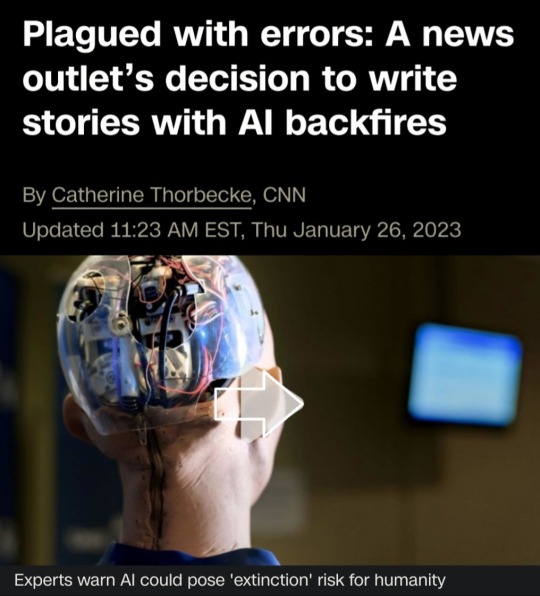
source: X
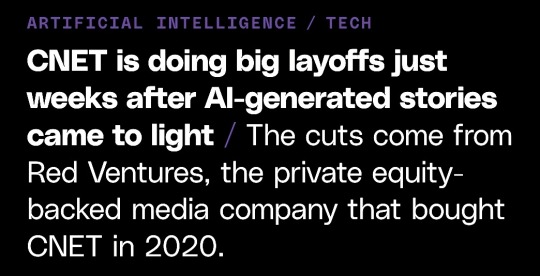
source: X

source: X
an example "story" now comes with this warning:
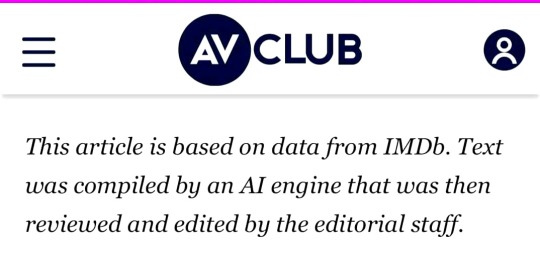
A new byline showed up Wednesday on io9: “Gizmodo Bot.” The site’s editorial staff had no input or advance notice of the new AI-generator, snuck in by parent company G/O Media.
G/O Media’s AI-generated articles are riddled with errors and outdated information, and block reader comments.
“As you may have seen today, an AI-generated article appeared on io9,” James Whitbrook, deputy editor at io9 and Gizmodo, tweeted. “I was informed approximately 10 minutes beforehand, and no one at io9 played a part in its editing or publication.”
Whitbrook sent a statement to G/O Media along with “a lengthy list of corrections.” In part, his statement said, “The article published on io9 today rejects the very standards this team holds itself to on a daily basis as critics and as reporters. It is shoddily written, it is riddled with basic errors; in closing the comments section off, it denies our readers, the lifeblood of this network, the chance to publicly hold us accountable, and to call this work exactly what it is: embarrassing, unpublishable, disrespectful of both the audience and the people who work here, and a blow to our authority and integrity.”
He continued, “It is shameful that this work has been put to our audience and to our peers in the industry as a window to G/O’s future, and it is shameful that we as a team have had to spend an egregious amount of time away from our actual work to make it clear to you the unacceptable errors made in publishing this piece.”
According to the Gizmodo Media Group Union, affiliated with WGA East, the AI effort has “been pushed by” G/O Media CEO Jim Spanfeller, recently hired editorial director Merrill Brown, and deputy editorial director Lea Goldman.
In 2019, Spanfeller and private-equity firm Great Hill Partners acquired Gizmodo Media Group (previously Gawker Media) and The Onion.
The Writers Guild of America issued a blistering condemnation of G/O Media’s use of artificial intelligence to generate content.
“These AI-generated posts are only the beginning. Such articles represent an existential threat to journalism. Our members are professionally harmed by G/O Media’s supposed ‘test’ of AI-generated articles.”
WGA added, “But this fight is not only about members in online media. This is the same fight happening in broadcast newsrooms throughout our union. This is the same fight our film, television, and streaming colleagues are waging against the Alliance of Motion Picture and Television Producers (AMPTP) in their strike.”
The union, in its statement, said it “demands an immediate end of AI-generated articles on G/O Media sites,” which include The A.V. Club, Deadspin, Gizmodo, Jalopnik, Jezebel, Kotaku, The Onion, Quartz, The Root, and The Takeout.
but wait, there's more:
Just weeks after news broke that tech site CNET was secretly using artificial intelligence to produce articles, the company is doing extensive layoffs that include several longtime employees, according to multiple people with knowledge of the situation. The layoffs total 10 percent of the public masthead.
*
Greedy corporate sleazeballs using artificial intelligence are replacing humans with cost-free machines to barf out garbage content.
This is what end-stage capitalism looks like: An ouroborus of machines feeding machines in a downward spiral, with no room for humans between the teeth of their hungry gears.
Anyone who cares about human life, let alone wants to be a writer, should be getting out the EMP tools and burning down capitalist infrastructure right now before it's too late.
648 notes
·
View notes
Text
Perfectionists
Title: Perfectionists
Fandom: MCU
Characters/Pairings: Bucky x Female!Reader
Word Count: 2.2k
Summary: SHIELD Games is behind one of the best MMORPGs on the market. SHIELD stays on top because of the super employees they have across the board from the tech innovation department, to the story writers, to their game engineers - including one Bucky Barnes. It's his perfection that has pushed him into this position at an elite place in the industry, period. But one game tester always seems to find the most frustrating things to send back to him.
Content/Concept Warnings: Gamer AU; strong language; explicit smut: oral - male receiving, mild dacryphilia, vaginal fingering, genital sex, voyerism, masturbation
Notes: TRIPLE THREAT SUBMISSION for @buckybarnesevents WEEK THREE of Hot Bucky Summer: "Where do you want me?", my fifth square of @buckybarnesbingo B5: "Playing Games," and my third square for Connect4 Alternate June-iverse: C1 "Gamer."
Masterlist | Aspen's Ask Box | Field Guide to the Forest

Bucky looked up as he heard Steve’s telltale footsteps – not the normal ones – the trepidatious ones.
“No,” he said, tone stone cold.
Steve stopped a few steps away and sighed, putting his hands on his hips.
“How long is the list?”
“Buck.”
Bucky shook his head and pushed away from his desk. “You know what? No. I don’t even want to see it.”
He stormed out of the engineering and design lab, and Steve dropped his head back to look at the ceiling.
Sam chuckled. “I told you, man, you should wait until he’s out of the room to bring in new lists of purgatory for perfection.”
“He never takes a break. None of you take breaks,” Steve said.
“'Attitude reflects leadership, Captain.'"
"Don't quote Remember the Titans at me."
“Barnes just needs to fuck her.”
Steve’s head snapped over to Nat. “You know what, Romanoff?”
“She’s right,” Joaquin added without looking up from his screen, but a smirk on his face none the less. “His blood has been boiling for her for months, it’s about time he stops ignoring that.”

“Shit, Barnes!” you yelped, clutching your heart with one hand and an energy drink in the other. “Anyone ever tell you not to lurk in the dark?”
“I’m not lurking,” he groused.
“What else do you call lying in wait to confront someone? Especially in the dark? Alone? Leaning up against the wall, no less.”
You knew you were far from the only person in the building, but this late at night, you were the only tester still around and usually had this wing of the offices to yourself. This was a side gig for you, you only did it because you loved the game and loved getting to preview things before it was even sent to the beta test group of users, but that meant you usually only crossed paths with the handful of other official tester employees for SHIELD Games like ships passing in the night who basically clocked normal business hours.
“I don’t see you turning on any lights,” he said as you returned to your preferred spot on the couch.
“I prefer to play by glow of television,” you responded with a dramatic tone.
If Bucky rolled his eyes, you didn’t see it. “It’s how I’d be playing at home, keeps me focused so I can help you do your job.”
Which is why he was here confronting you, as you had so aptly noted. “I’m damn good at what I do.”
“And the only reason you hate my lists is because you’re already a god damn perfectionist so you can’t stand when I point out the flaws you missed or suggestions to make your work even better. But that’s why Maria hired me. Your community manager knew the user feedback I was giving when you launched the game was excellent.”
Bucky scoffed and shook his head, crossing his arms.
“Your game is only perfect after they put it in front of my face, Barnes.”
“Shut up.”
It was your turn to scoff. “Make me,” you said and took a swig of your energy drink.
Bucky pushed off the wall and in three swift, silent steps was in front of you. With your head tilted back as you drank, you only saw him when he leaned forward, looming over you. You spluttered a little, and he smirked.
“You won’t be able to talk with this in front of your face,” he said, opened the front of his jeans, and pushed the denim and his boxers down his thighs in one go.
You would have roasted him for saying something so cliché in any other circumstance. But your brain was short-circuiting, and you were trying to rapidly re-establish the connections.
His right hand took the can out of your grasp and set it on the side table next to the couch, and his left hand cradled your chin, his thumb pressing on your bottom lip.
You looked up at him. Your heart was racing, and your pussy was thrumming. You were not certain this was real. He’d been the quiet one, a bit surly, but you had been surprised enough he’d come to confront you about the feedback in the first place and never would have put a penny on the odds of something like this happening with the gorgeous game designer you’d harbored a bit of a crush on but decided after the first week wouldn’t come to anything.
This was an unexpected side quest.
You nodded.
He pushed the tip to the edge of your lips, your tongue slipped out to circle the head. In one swift motion he gripped the back of your head and thrust his cock into your mouth, hitting the back of your throat, and your hands flew up to hold onto his hips.
He used your mouth with abandon, and the hold of your hands on his hips was firm, encouraging. When you choked on his thick member, he slowed for a moment, then you squeezed his hip, and he speed up to his brutal pace again. This happened twice more, you having taken him deeper in your throat each time. Tears streamed down your face now, and he groaned when he looked down at you.
“You look so god damn beautiful,” he couldn’t help saying.
You whimpered, and he swept a thumb over your cheek, wiping away the tears, then brought them to his mouth.
He could feel the build of his climax at the root of him, and pulled out of your mouth abruptly, knowing he was too close to finishing and not ready for this to come to an end yet.
You fell forward, but he was instantly kneeling in front of you, ready to catch your lips with his. The kiss was hungry, and your mouth full of the taste of him made him groan again. Your hands tangled in his hair, slotting in despite being pulled back in a low bun. His hands had returned to hold your head as commandingly as they had when he was fucking your throat – one in your hair, one along your jaw.
When you were absolutely breathless, you finally pulled away.
Foreheads planted against each other, breaths still mingling, you licked your lips.
“Why don’t I show you what these hands can do?” he asked, one hand falling to your hip, rubbing his thumb down the crease of your thigh toward your core.
“Don’t tease.”
“Oh, no,” he agreed. Then with both hands, he pulled your hips to the edge of the cushion, hooked his fingers into the top of your pants, and peeled them down along with your panties. You pushed up to raise your hips so he could remove them completely, but your efforts were hardly needed as he used one hand to push you up, and the small show of unexpected strength made your insides squirm. He was built – you had seen it – but you hadn’t experienced the reality of it.
Bucky didn’t leave you a second to think about it any further as his fingers slid up and down your wet slit, he spread your outer folds and stroked your soft inner folds, and you moaned. Your eyes slipped shut, but you felt him watching your face. He was watching for how you reacted to each of his ministrations. He pinched your clit, and you yelped.
Your eyes flew open, and you saw his were filled with a mischievous glint. “Just testing all the possibilities,” he said.
You hit his shoulder. “I said no teasing!”
“You always want the experience to have more unexpected elements for the user to play with.”
“Bucky!” You did not want to hear one of your recent lines of feedback recited back to taunt you.
Except you did.
He was playing this game so well.
He slipped two fingers from that large, warm hand of his inside your cunt and began to pump. Your eyes melted closed again, and seemingly satisfied with his study, you felt Bucky claim your lips for more kisses while he pulled you closer and closer to an orgasm. It built steadily, his thumb at your clit, fingers in your channel, but when he curled those fingers and found the spongy spot against your pubic bone, it hit you instantly, and you cried out his name. He pulled your head into the crook of his neck while his other hand slowed in your cunt but helped prolong riding out the waves of your pleasure.
“Satisfactory experience?” he asked once your breathing started to return to normal.
You laughed against his shoulder, then pulled back to look at him. You pressed a kiss to his jaw, and he smiled.
“You know, I wasn’t afraid to poke the bear because you’re brilliant, I knew you could take it. You want to be the best, and I help give you that.” You reached down and took his still hard, leaking cock in your soft hands, and Bucky’s breath hitched. “Now, do you want to let me take you? I’m aching for you to fill me up.”
He groaned. “You can’t say shit like that.”
You nipped at his bottom lip and smirked. “Yes, I can. This company values my direct and honest feedback.”
He huffed a laugh.
“Where do you want me?”
Bucky quickly shoved his jeans all the way down his legs and settled down next to you on the couch, legs spreading wide. “In my lap.”
“Sounds just about right,” you said, straddling him.
His eager hands pulled your slick cunt flush against his groin, and you both moaned. You planted your hands on his broad shoulders, and rocked your hips just a little bit. Even that short back and forth of friction, his cock stroking your engorged clit, had your head falling back. Bucky pressed his lips to the column of your throat, not wasting an opportunity so inviting in the moment. You sighed and held his head to your neck where he continued to explore and mark you with slow, hot kisses, finding the places that made you shiver.
While you were lost in those sensations, Bucky reached down and lined his cock up with your slit, but that brought you back to the thrumming need to be filled by him, and you sunk down while he thrust up into you. He was thick, and he filled you more than you were used to, but not to a point of pain -far, far from it.
“Feel so good inside me,” you keened.
“No feedback?”
“Just fuck me until I can’t breathe, Buck.”
“With pleasure,” he growled.
After passing through two intense first levels of play, climbing to the final peak did not take long. One of his hands remained anchored at your hip to control the punishing but desired pace of thrusts, but his other steadily slid underneath your shirt and up your spine in a delicate way in contrast to everything else happening in the moment, including your lips returning to his in another kiss designed to devour.
Bucky felt you hit that crest of the climax, your muscles seizing in a moment of bliss, your pussy clenching hard around his cock. As you came down, he maneuvered you both to lay your back on the couch while he did just as you asked and continued to thrust into you hard, you boneless but in a blissful haze, unconcerned with trivial things like breathing, while he pursued his own pleasure. Then all at once he groaned and began to spill his hot seed inside of you, pausing for a second with the first ropes of cum, but then continued with deep, slow thrusts until he was completely spent.
It was a snug shuffling, but the two of you managed to get so you were both laying on your sides on the couch, your back up against the cushioned backboard, Bucky’s back to the glow of the giant television screen so all his muscled angles were sillhouted for you to admire in the afterglow. His legs were bunched up – possibly uncomfortably – and you tangled yours with his. You pushed some hair that had escaped from its knot at the back of his head off of his face, and he grabbed your hand and pressed a kiss to your palm.
“I think we’ll need to continue testing this,” you whispered against his lips.
You felt them curve into a smile before he said, “Thorough testing, absolutely. Need to explore all potential scenarios.”
“I’m glad you’ll be more amenable now to my feedback.”
“Oh, I never said that.”
You poked him in the ribs.
“Come on, you love the complex storylines. You don’t want me easily conquered.” And before you could protest, and claimed your lips again, this time in a long, slow kiss, no intention of leaving any time soon.

Too caught up with each other, neither of you heard the approaching footsteps, the gasp on discovering you, the moans they bit back when they gave over to touching themselves there in the dark, watching you, or their nearly silent retreat.


Masterlist | Aspen's Ask Box | Field Guide to the Forest
#bucky barnes smut#bucky barnes au#bucky barnes x reader#bucky barnes x female reader#buckybarnesbingo2023#bbb2023#hotbuckysummer2023#connect4au#gamer au#bucky barnes x you#bucky barnes x yn#bucky barnes x y/n#female reader#reader insert#x reader#x reader smut#x reader stories#aspen wrote something
426 notes
·
View notes
Text
WARP CORE DEEP DIVE!

Where it all began. So much so, that they never quite nailed down what anything in engineering was. We know the thing in the middle was a "matter/antimatter integrator" and it had a dilithium crystal in it. But it didn't appear until later on, the floor was originally empty. There were also large transformer-ish things that moved about as the plot demanded. The big thing behind the mesh? That's the pipe cathedral. Maybe it was an impulse engine (as per the old Star Trek Blueprints by Franz Joseph) or perhaps it was part of the warp drive. Originally the idea was that the warp nacelles generated their own power. But that would change soon...

The Animated Series gave us something very similar to the TOS engine room, with the pipe cathedral and one BIG transformer, but instead of the matter/antimatter integrator we got a glass tube with what looked like measurements on it. Maybe it's a proto-warp core a la TMP, especially since it's in a similar spot to Strange New Worlds'. Or maybe it's a coolant pipe like the 2009 movie. Who knows? We also saw inside the "antimatter nacelle" in one episode, which is generally assumed to mean inside one of the warp engines themselves but it's all a bit vague.

The Motion Picture gave us the original Big Blue Lava Lamp, the physical set was 3 stories high but augmented with forced-perspective, in the form of a painting at the bottom of the shaft and a truncated horizontal intermix chamber crewed by children at the end of the main level. The engineering crew on the main deck now wear radiation suits, adding to the idea this big blue thing isn't your friend.
This was also the Big Retcon, making the intermix chamber the power source for the warp nacelles. Every Trek regardless of era would follow this route.
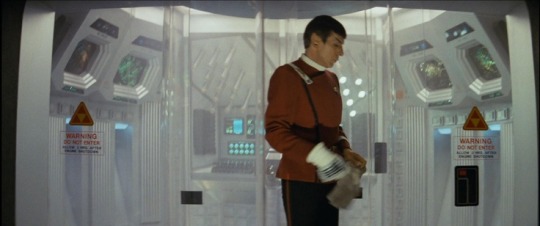
In Wrath of Khan, they'd add a very important side room with dilithium crystals in for Spock to self-sacrifice in. I always found it very amusing this room, where the most important part of the engineering machinery was, was in no way physically connected to the intermix chamber. Nor did it exist in the previous movie.

The Next Generation gave us a pot-bellied stove, with neon segments glowing one-by-one up and down to give the impression of pulses of energy colliding in the middle then being fed to the nacelles. No more radiation suits needed, and the room has a nice carpet. This was also the first time "warp core" was used, a phrase that would retroactively be applied to all the prior ones.
The Enterprise-E and DS9's Defiant would have bigger and smaller warp cores that were variations on the same theme as TNG.
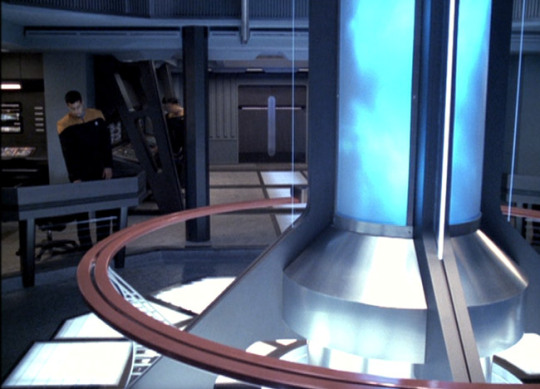
Voyager brought back the classic Motion Picture big blue lava lamp, just without the horizontal tube this time. It does the nifty swirly thing too. Q Junior makes it do club lighting one time.

NX-01 Enterprise is just kind of this big industrial tank with some glowy bits. It's weird that in the classic movies they needed radiation suits to work in engineering, but in the series set 100 years earlier they didn't.

The 2009 reboot filmed engineering in a thinly disguised Budweiser brewery, which made the area look enourmous and extremely complex, but lost all the high tech clean room vibes prior shows had. What in real life were giant brewing tanks housed the intermix chambers which made up the warp core, which were ejected through a hatch in the roof at the end. This look was extremely controversial with some, but personally I loved it.

In Into Darkness the warp core looks like an almighty piece of kit, and that's because they shot on location at the Lawrence Livermore National Ignition Facility. It's a real-life fusion reactor. And then you can climb inside it and it turns out that inside is one very important laser thing, some dilithium crystals you barely see and lots of deadly radiation. At least the self sacrificing happens inside the core itself and not a weird separate side chamber this time. The brewery from the last movie was still there, implying this was all along even if we didn't visit it. But that complicates things because the bits they called the warp core are very different. Perhaps the intermix chambers ejected last movie and core seen here are all part of the same huge warp core system.

Strange New Worlds reboots the original... sort of. They put a vertical intermix chamber in there and instead of a mesh and forced perspective they've got an AR wall with an enourmous array of high tech pipes. But weirdly, the writers guide says the big AR wall with the updated pipe cathedral is the deflector dish machinery not the warp core. I guess the confusion makes it more authentic TOS.
#star trek#star trek the original series#the next generation#tng#ds9#star trek aos#starship design#deep lore#warp core
290 notes
·
View notes
Text
Fatal Attraction
Chapter Nine


Pairings: Wanda Maximoff x GN! Reader/ Wanda Maximoff x Jarvis Stark
Warnings: Angst. Fluff.
Taglist : @natashamaximoff-69 @canvascoloredin @wizardofstories @louxbloom @wandanats-goodgirl @the-ox-fan20 @ladyqueenxoxo @aemilia19 @wandaromamoff69 @mfd-101 @dorabledewdroop @marvelogic @dopeyouth @karsonromanoff @bimad @natashaswife4125 (if you want to be added to my taglist, please DM me or comment)
18+ MINORS DNI
Y/N watched as Wanda grew more and more confident since she started to meet with Opal and started the divorce proceedings. Soon enough the elevator doors opened to reveal Gwen in her lab coat.
“We have a slight problem.” She told them as she approached Y/N.
“What is it?” They questioned as Gwen took a deep breath.
“We have been hacked.” She told them urgently. “The blueprints for the Oscorp/Hammer project were the only things stolen.”
“Ok.” Y/N started to move towards their office. “Just one moment and we will go to IT.” She watched as they entered their office, typing away on their computer.
“What’s going on?” Wanda asked them curiously as Opal observed the two.
“Nothing to worry about, but please don’t leave this office.” They told her. “Both of you.” They looked to Opal as Wanda nodded. “I’ll explain everything once I’ve sorted it, I have also shut down the company wifi for the time being.”
“What?” Wanda questioned as she went to follow them but Opal beat her to it.
“Y/N, what has happened?” She asked as she pulled them to the side.
“We have been hacked.” They whispered as Opal sighed. “An important project has been stolen and I plan on getting to the bottom of it.”
“I warned you.” She whispered as she glanced back at Wanda. “This has Stark written all over it.”
“I know.” Y/N groaned as they looked into the older woman’s eyes. “But I can’t help but feel this way, like I need to help her, protect her. I just need her to be safe.”
“You’re in love with her.” She gasped as Y/N nodded. “That’s why you’re hellbent on getting her out of this loveless marriage.”
“I do.” They answered. “But I just want what’s best for her.” She smiled at them before they continued. “Just keep her inside the office, I have this floor on lock down so there will be no unexpected guests before my return, and you know where the fridge is.”
The two watched as Y/N followed Gwen into the lift, Opal approached Wanda and led her back inside the office.
“Come dear, we have much to do.” She told the younger woman as she closed the door behind them. Moving to grab a couple of drinks before continuing their task at hand as Y/N and Gwen raced towards the IT department.
“Scott, please tell me you have something.” Y/N spoke as they entered the Tech lab.
“I am trying to break down the digital footprints, hoping to get an IP but so far nothing.” He told them as he typed away.
“Have you accessed the remote wifi?” They asked him as he shook his head. Y/N then pushed him out of the way as they grabbed their USB from their coat. The two watched as they typed away on the computer, listening as they mumbled to themselves.
“Anything?” Gwen asked them as she stepped beside them, watching as they tried to break through the firewall.
“I am getting closer but whoever this is, they are much better at hacking than our very own IT minion.” They raised their voice as their anger was getting the better of them.
“Maybe we should inform the police?” Scott asked as Y/N laughed.
“No!” They yelled. “We settle this in house.” They started to type away again before talking once more. “How’s Jean doing?” They asked, causing Gwen to smirk as Scott looked unsure.
“She is great, really tired.” He answered them.
“She’s due soon right?” They asked him as he nodded.
“Yeah, she is due next week.” He answered them.
“You should bring the two of them in when she’s had the baby.” They told him as they straightened up. “It’s someone at Hammer Industries.” The two looked confused as Y/N fixed their jacket. “Get the evidence in a secure file for me. I have a call to make.” Scott nodded as Gwen followed Y/N to the lift.
“You’re not going to do anything stupid are you?” She asked them as they smirked.
“Since when have you known me to do anything stupid?” They questioned as she raised a brow. “You know what? Forget what I asked.”
“I have known you forever.” She told them as they stepped inside the lift. “I know you better than you know yourself.”
“Look, this is my company Gwen. My whole teen and adult life has been spent here, in this building. Learning as much as I possibly could, I am not going to let someone come here and steal from under my nose.” They told her firmly, soon stepping out of the lift and heading to Wanda’s desk, getting out the address book they had.
“Y/N, this could be dangerous. Maybe my dad can help.” She tried as Y/N shook their head no. “Come on.”
“Look, I am not going to do anything stupid.” They told her as they picked up the phone, Gwen’s eyes soon seeing the name of the person they were calling.
“You can’t be serious?! Cottonmouth?” She whispered as Y/N soon started to talk with the person on the other end, their eyes never leaving Gwen’s as they spoke.
“Ok. Thanks.” They soon hung up to see Gwen’s disapproving stare. “He owes me.”
“Y/N, this isn’t going to work!” She yelled at them, alerting the two women just beyond the wall. “He is dangerous, even worse than KP.”
“Look, I have a way of doing things.” They told her as they stood up. “If you don’t like it, then just shut up.”
“Y/N, I worry that you will get hurt, or worse.” She told them softly. “You’re my best friend above all else, and I couldn’t live with myself if you died.” Y/N’s eyes softened as they watched her wipe away a stray tear.
“I’m sorry Gwen.” They whispered. “But I have to do this. This company is all of our livelihoods. Our means of survival and I need to make sure that you and everyone else in this building is protected.”
“I’m going back to my lab.” She whispered as she straightened up. “Scott will be up soon with your file.” With that she left as the door opened, revealing Opal with her bag ready to leave.
“You need to be careful Y/N/N.” She told them as they nodded. “Your mom would kick my ass if anything happened to you.”
“I will.” They assured her. “I know what I have to do.” She sighed knowing she will never break through to them.
“So, what happened?” Wanda asked as she followed Y/N inside their office, closing the door behind her.
“We were hacked.” They told her as they looked over the city. “Someone at Hammer hacked into our database and stole the blueprints from the very project we were working on together!” They turned to face Wanda who remained steady on her feet. “They stole from us and everyone is practically telling me to sit back, just let the authorities deal with it.”
“Maybe you should.” Wanda told them as she stepped closer to them. “It would be safer, maybe terminate the contract since they have broken it.” They listened as she spoke. “We can organise a meeting next week with Justin Hammer and his associates, make it a formal matter, have Opal on our side, and a notary too.” She took their hand as they looked into her eyes. “Make sure that soon enough you will ruin them, from the legal route.”
“I.” They sighed as they closed their eyes, the closeness between the two as Wanda caressed their face.
“Don’t say anything.” She whispered as her lips ghosted theirs. Y/N released a shaky breath before kissing her tenderly, their hands soon moving to her hips as the kiss deepened. Pushing her up against the window as the kiss grew hungrier by the second.
“I can’t.” They whispered as Wanda looked at them. “I can’t do this here.”
“Then where?” She asked them as they stepped away.
“I just, you’re still married.” They whispered as she sighed.
“Not for long though.” She told them.
“But still, I don’t want this.” They pointed between the two of them. “To be just about sex. You deserve more than that.” With that they left the office, leaving a bewildered Wanda behind.
#wanda maximoff x reader#wanda maximoff#marvel#elizabeth olsen#wanda x you#elizabeth olsen x reader#wanda x reader#wanda x y/n#wanda maximoff x you#natasha romanoff
202 notes
·
View notes
Text
Several tech leaders have publicly withdrawn their attendance from a top industry conference in Europe next month after the summit's CEO criticized Israel in a tweet.
Paddy Cosgrave, an Irish entrepreneur and the co-founder of Web Summit, an annual technology conference held in Lisbon each November, stoked outrage among his colleagues after he accused Israel of committing war crimes.
"I'm shocked at the rhetoric and actions of so many Western leaders & governments, with the exception in particular of Ireland's government, who for once are doing the right thing," Cosgrave wrote on X, formerly known as Twitter, on Friday. "War crimes are war crimes even when committed by allies, and should be called out for what they are."[...]
Prior to his tweet about war crimes, Cosgrave had previously praised the Irish government for rejecting a bid to suspend European Union aid to Palestinians before EU foreign ministers reversed the decision to cancel the assistance.
Israel's ambassador to Portugal, Dor Shapira, announced Monday that his country would no longer participate in the Web Summit conference as a result of Cosgrave's "outrageous statements."[...]
Shapira said "dozens" of companies had also pulled out of the event and he encouraged more to do so.[...]
Several industry leaders have since said they will also cancel their appearances and attendances at the upcoming Web Summit conference, including Garry Tan, CEO of Y Combinator; Ori Goshen, co-CEO of AI21 Labs; Ravi Gupta, a partner at Sequoia; Keith Peiris, CEO of Tome; Adam Singolda, head of advertising company Taboola; and David Marcus, CEO of Lightspark and former PayPal chief executive.[...]
On Sunday, two days after Cosgrave accused Israel of committing war crimes, he added an addendum to his original tweet, condemning the Hamas attacks as "outrageous and disgusting."
"Israel has a right to defend itself, but it does not, as I have already stated, have a right to break international law," Cosgrave wrote.[...]
A couple hours later, amid news of increasing Web Summit cancellations, however, Cosgrave appeared to double down on his original remarks.
"To repeat: War crimes are war crimes even when committed by allies & should be called out for what they are," Cosgrave wrote. "I will not relent."
Cant even handle the most mild condemnation couched in #bothsides [16 Oct 23]
185 notes
·
View notes
Text
The specific process by which Google enshittified its search
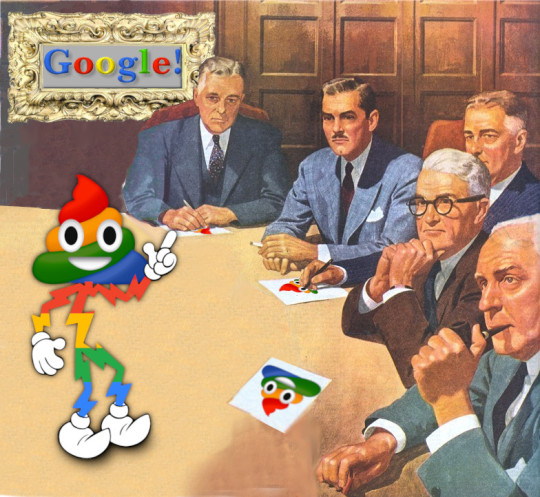
I'm touring my new, nationally bestselling novel The Bezzle! Catch me SATURDAY (Apr 27) in MARIN COUNTY, then Winnipeg (May 2), Calgary (May 3), Vancouver (May 4), and beyond!

All digital businesses have the technical capacity to enshittify: the ability to change the underlying functions of the business from moment to moment and user to user, allowing for the rapid transfer of value between business customers, end users and shareholders:
https://pluralistic.net/2023/02/19/twiddler/
If you'd like an essay-formatted version of this thread to read or share, here's a link to it on pluralistic.net, my surveillance-free, ad-free, tracker-free blog:
https://pluralistic.net/2024/04/24/naming-names/#prabhakar-raghavan
Which raises an important question: why do companies enshittify at a specific moment, after refraining from enshittifying before? After all, a company always has the potential to benefit by treating its business customers and end users worse, by giving them a worse deal. If you charge more for your product and pay your suppliers less, that leaves more money on the table for your investors.
Of course, it's not that simple. While cheating, price-gouging, and degrading your product can produce gains, these tactics also threaten losses. You might lose customers to a rival, or get punished by a regulator, or face mass resignations from your employees who really believe in your product.
Companies choose not to enshittify their products…until they choose to do so. One theory to explain this is that companies are engaged in a process of continuous assessment, gathering data about their competitive risks, their regulators' mettle, their employees' boldness. When these assessments indicate that the conditions are favorable to enshittification, the CEO walks over to the big "enshittification" lever on the wall and yanks it all the way to MAX.
Some companies have certainly done this – and paid the price. Think of Myspace or Yahoo: companies that made themselves worse by reducing quality and gouging on price (be it measured in dollars or attention – that is, ads) before sinking into obscure senescence. These companies made a bet that they could get richer while getting worse, and they were wrong, and they lost out.
But this model doesn't explain the Great Enshittening, in which all the tech companies are enshittifying at the same time. Maybe all these companies are subscribing to the same business newsletter (or, more likely, buying advice from the same management consultancy) (cough McKinsey cough) that is a kind of industry-wide starter pistol for enshittification.
I think it's something else. I think the main job of a CEO is to show up for work every morning and yank on the enshittification lever as hard as you can, in hopes that you can eke out some incremental gains in your company's cost-basis and/or income by shifting value away from your suppliers and customers to yourself.
We get good digital services when the enshittification lever doesn't budge – when it is constrained: by competition, by regulation, by interoperable mods and hacks that undo enshittification (like alternative clients and ad-blockers) and by workers who have bargaining power thanks to a tight labor market or a powerful union:
https://pluralistic.net/2023/11/09/lead-me-not-into-temptation/#chamberlain
When Google ordered its staff to build a secret Chinese search engine that would censor search results and rat out dissidents to the Chinese secret police, googlers revolted and refused, and the project died:
https://en.wikipedia.org/wiki/Dragonfly_(search_engine)
When Google tried to win a US government contract to build AI for drones used to target and murder civilians far from the battlefield, googlers revolted and refused, and the project died:
https://www.nytimes.com/2018/06/01/technology/google-pentagon-project-maven.html
What's happened since – what's behind all the tech companies enshittifying all at once – is that tech worker power has been smashed, especially at Google, where 12,000 workers were fired just months after a $80b stock buyback that would have paid their wages for the next 27 years. Likewise, competition has receded from tech bosses' worries, thanks to lax antitrust enforcement that saw most credible competitors merged into behemoths, or neutralized with predatory pricing schemes. Lax enforcement of other policies – privacy, labor and consumer protection – loosened up the enshittification lever even more. And the expansion of IP rights, which criminalize most kinds of reverse engineering and aftermarket modification, means that interoperability no longer applies friction to the enshittification lever.
Now that every tech boss has an enshittification lever that moves very freely, they can show up for work, yank the enshittification lever, and it goes all the way to MAX. When googlers protested the company's complicity in the genocide in Gaza, Google didn't kill the project – it mass-fired the workers:
https://medium.com/@notechforapartheid/statement-from-google-workers-with-the-no-tech-for-apartheid-campaign-on-googles-indiscriminate-28ba4c9b7ce8
Enshittification is a macroeconomic phenomenon, determined by the regulatory environment for competition, privacy, labor, consumer protection and IP. But enshittification is also a microeconomic phenomenon, the result of innumerable boardroom and product-planning fights within companies in which would-be enshittifiers try to do things that make the company's products and services shittier wrestle with rivals who want to keep things as they are, or make them better, whether out of principle or fear of the consequences.
Those microeconomic wrestling-matches are where we find enshittification's heroes and villains – the people who fight for the user or stand up for a fair deal, versus the people who want to cheat and wreck to make things better for the company and win bonuses and promotions for themselves:
https://locusmag.com/2023/11/commentary-by-cory-doctorow-dont-be-evil/
These microeconomic struggles are usually obscure, because companies are secretive institutions and our glimpses into their deliberations are normally limited to the odd leaked memo, whistleblower tell-all, or spectacular worker revolt. But when a company gets dragged into court, a new window opens into the company's internal operations. That's especially true when the plaintiff is the US government.
Which brings me back to Google, the poster-child for enshittification, a company that revolutionized the internet a quarter of a century ago with a search-engine that was so good that it felt like magic, which has decayed so badly and so rapidly that whole sections of the internet are disappearing from view for the 90% of users who rely on the search engine as their gateway to the internet.
Google is being sued by the DOJ's Antitrust Division, and that means we are getting a very deep look into the company, as its internal emails and memos come to light:
https://pluralistic.net/2023/10/03/not-feeling-lucky/#fundamental-laws-of-economics
Google is a tech company, and tech companies have literary cultures – they run on email and other forms of written communication, even for casual speech, which is more likely to take place in a chat program than at a water-cooler. This means that tech companies have giant databases full of confessions to every crime they've ever committed:
https://pluralistic.net/2023/09/03/big-tech-cant-stop-telling-on-itself/
Large pieces of Google's database-of-crimes are now on display – so much, in fact, that it's hard for anyone to parse through it all and understand what it means. But some people are trying, and coming up with gold. One of those successful prospectors is Ed Zitron, who has produced a staggering account of the precise moment at which Google search tipped over into enshittification, which names the executives at the very heart of the rot:
https://www.wheresyoured.at/the-men-who-killed-google/
Zitron tells the story of a boardroom struggle over search quality, in which Ben Gomes – a long-tenured googler who helped define the company during its best years – lost a fight with Prabhakar Raghavan, a computer scientist turned manager whose tactic for increasing the number of search queries (and thus the number of ads the company could show to searchers) was to decrease the quality of search. That way, searchers would have to spend more time on Google before they found what they were looking for.
Zitron contrasts the background of these two figures. Gomes, the hero, worked at Google for 19 years, solving fantastically hard technical scaling problems and eventually becoming the company's "search czar." Raghavan, the villain, "failed upwards" through his career, including a stint as Yahoo's head of search from 2005-12, a presiding over the collapse of Yahoo's search business. Under Raghavan's leadership, Yahoo's search market-share fell from 30.4% to 14%, and in the end, Yahoo jettisoned its search altogether and replaced it with Bing.
For Zitron, the memos show how Raghavan engineered the ouster of Gomes, with help from the company CEO, the ex-McKinseyite Sundar Pichai. It was a triumph for enshittification, a deliberate decision to make the product worse in order to make it more profitable, under the (correct) belief that the company's exclusivity deals to provide search everywhere from Iphones and Samsungs to Mozilla would mean that the business would face no consequences for doing so.
It a picture of a company that isn't just too big to fail – it's (as FTC Chair Lina Khan put it on The Daily Show) too big to care:
https://www.youtube.com/watch?v=oaDTiWaYfcM
Zitron's done excellent sleuthing through the court exhibits here, and his writeup is incandescently brilliant. But there's one point I quibble with him on. Zitron writes that "It’s because the people running the tech industry are no longer those that built it."
I think that gets it backwards. I think that there were always enshittifiers in the C-suites of these companies. When Page and Brin brought in the war criminal Eric Schmidt to run the company, he surely started every day with a ritual, ferocious tug at that enshittification lever. The difference wasn't who was in the C-suite – the difference was how freely the lever moved.
On Saturday, I wrote:
The platforms used to treat us well and now treat us badly. That's not because they were setting a patient trap, luring us in with good treatment in the expectation of locking us in and turning on us. Tech bosses do not have the executive function to lie in wait for years and years.
https://pluralistic.net/2024/04/22/kargo-kult-kaptialism/#dont-buy-it
Someone on Hacker News called that "silly," adding that "tech bosses do in fact have the executive function to lie in wait for years and years. That's literally the business model of most startups":
https://news.ycombinator.com/item?id=40114339
That's not quite right, though. The business-model of the startup is to yank on the enshittification lever every day. Tech bosses don't lie in wait for the perfect moment to claw away all the value from their employees, users, business customers, and suppliers – they're always trying to get that value. It's only when they become too big to care that they succeed. That's the definition of being too big to care.
In antitrust circles, they sometimes say that "the process is the punishment." No matter what happens to the DOJ's case against Google, its internal workers have been made visible to the public. The secrecy surrounding the Google trial when it was underway meant that a lot of this stuff flew under the radar when it first appeared. But as Zitron's work shows, there is plenty of treasure to be found in that trove of documents that is now permanently in the public domain.
When future scholars study the enshittocene, they will look to accounts like Zitron's to mark the turning points from the old, good internet to the enshitternet. Let's hope those future scholars have a new, good internet on which to publish their findings.

If you'd like an essay-formatted version of this post to read or share, here's a link to it on pluralistic.net, my surveillance-free, ad-free, tracker-free blog:
https://pluralistic.net/2024/04/24/naming-names/#prabhakar-raghavan
#pluralistic#ed zitron#google#microincentives#constraints#enshittification#rot economy#platform decay#search#ben gomes#code yellow#mckinsey#hacking engagement#Prabhakar Raghavan#yahoo#doj#antitrust#trustbusting
445 notes
·
View notes
Text
Modern au where Sanji and Luffy fall in love while Sanji is engaged. Similar to the events of WCI, Sanji is in a forced business marriage. A merger of Germa Tech. and LinLin Industries. Sanji has no feelings of hatred, he accepts since that is what he’s supposed to do, and who knows, maybe he will fall in love with whomever he’s engaged to. At least then, he’ll be able to leave his family. He signs up at a gym after snide remarks from his family about his weight and meets Luffy as he struggles with one of the machines. Luffy is pure sunshine, and Sanji envies that; he seems so free. Luffy is a personal trainer part-time and a semi-pro boxer. As they spend more time together, Sanji starts to realize that he’s falling more and more in love with Luffy (for added drama, he maybe doesn’t tell Luffy that he’s engaged). Luffy falls first; he tells Sanji as such after Sanji cooks for him for the first time (maybe as a thank you, but also as an excuse to spend more time together). Sanji is hesitant, though he feels the same way, but Luffy doesn’t give up. Somehow, Sanji’s family realizes what’s happening, and they find Luffy. They threaten him and attempt to silence him, Luffy fights back and wins (obviously). He goes to talk to Sanji, and Sanji finally tells Luffy everything. Luffy gets upset, not at Sanji, but at his family and wishes he beat up the goons they sent even harder. Luffy and Sanji meet up with the smartest person Luffy knows (Nami), and together, they come up with a solution. Something something, Sanji finally confronts his family and gets together with Luffy.
#picturing Reiju as having left the family years prior and regrets not taking Sanji with her. so maybe there's a scene where they reconnect#anyways pls tell me something like this exists somewhere#or if someone that writes wants to take this then please go for it!! and also let me know so I can read it#tbh could be any sanji ship but I just really love sanlu#sanlu#black leg sanji#monkey d luffy#sanji#luffy#one piece#oh also ->#tw weight#tw body insecurity#the vinsmokes suck
77 notes
·
View notes